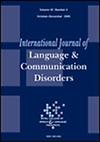Developmental language disorder and neurodiversity: Surfacing contradictions, tensions and unanswered questions
Abstract
Background
Neurodiversity is increasingly discussed in relation to autism research and practice. However, there is a lack of scholarship concerning the neurodevelopmental condition of Developmental Language Disorder (DLD) and the neurodiversity movement. While this movement may hold opportunities for the DLD community, the application of the concept of neurodiversity to DLD research and practice needs consideration, as DLD and autism have very different levels of public and professional awareness and understanding.
Aims
In this article, we discuss what the concept of neurodiversity and the associated neurodiversity movement could mean for DLD research and practice. We aim to critique some assumptions that may arise from the application of neurodiversity principles (or assumed principles) to the field of DLD.
Methods
This is a discussion paper, drawing on the personal experiences and reflections of the author team.
Main Contributions
We make the case for why DLD should be included in discussions about neurodivergence and outline considerations for doing so, and why some issues and applications may be particular to DLD. We outline points of similarity and contrast with autism in relation to our understanding of neurodiversity. We consider the issues around diagnosis and terminology and urge practitioners to continue to diagnose DLD using currently agreed terminology, so as not to undermine recent awareness efforts. We note that a neurodiversity-informed perspective challenges us to offer interventions that operate at the level of our environments, not just at the level of an individual. Indeed, neurodiversity offers a platform to argue for better rights and more inclusive spaces in mental health settings, education and work for children and adults with DLD.
Conclusions
DLD should be considered from a neurodiversity-informed perspective, and it is our hope that this will lead to neurodiversity-affirming practice that will afford young people with DLD better understanding from members of the public and the professionals who work with them. Further work is needed to better support children, young people and adults with DLD to have a voice in the neurodiversity movement.
WHAT THIS PAPER ADDS
What is already known on the subject
- Neurodiversity approaches are increasingly being taken up in research and practice in relation to autism, meaning that our understanding of autism and how autistic people are supported is increasingly drawing on the principles of neurodiversity. However, autism is not the only neurodivergent population. Developmental Language Disorder (DLD) is another neurodevelopmental condition; however, relative to autism, DLD has lower awareness amongst professionals and the public. There has been no scholarship that has examined DLD through the lens of neurodiversity, or considered the application of neurodiversity-affirming approaches to DLD.
What this paper adds to existing knowledge
- In this paper, we examine what the neurodiversity movement means for DLD research and practice. In particular, we consider what neurodiversity in the field of autism might teach us about the application of neurodiversity in the field of DLD, and highlight where we believe there are important differences between the two populations. We reflect on what neurodiversity means for intervention, diagnosis, terminology and championing the need for accessibility, especially with regard to mental health support, education and employment.
What are the potential or actual clinical implications of this work?
- Neurodiversity highlights the need to consider interventions at the level of an individual's environment (e.g., how can we make this space more inclusive?) as well as interventions operating at the level of the individual themselves (e.g., interventions focusing on an individual's language skills). We challenge the notion that neurodiversity-affirming approaches mean not diagnosing DLD or changing DLD's terminology: we argue that this is not in the spirit of the original neurodiversity movement, but also that for a condition with such low public awareness, these actions could do more harm than good for families affected by DLD. We call for more in-depth scholarship and discussion around the application of neurodiversity approaches to DLD and argue that the neurodiversity movement offers an important opportunity to raise better awareness and understanding of DLD in multiple sectors, including (but not limited to) mental health, education and employment.

 求助内容:
求助内容: 应助结果提醒方式:
应助结果提醒方式:


